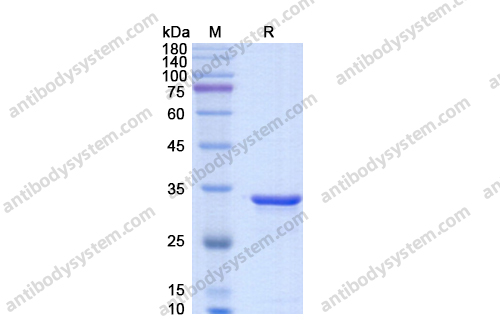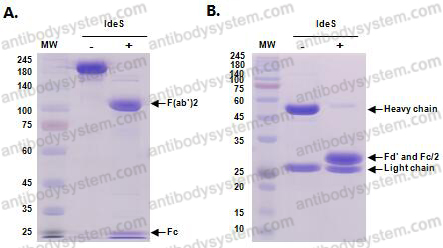Catalog No.
YXX05001
Description
IdeS Protease is an immunoglobulin-degrading enzyme from Streptococcus pyogenes (IdeS). It cleaves Immunoglobulin G (IgG) with high specificity at a single site below the hinge region, yielding F(ab’)2 and Fc fragments.
Biological activity
One unit will cleave ≥95% of 1μg of recombinant monoclonal IgG in 30 minutes at 37°C.
Expression system
E. coli
Species
Streptococcus pyogenes
Protein length
IdeS Protease is cloned from Streptococcus pyogenes and expressed in E.coli.
Predicted molecular weight
37.57 kDa
Nature
Recombinant
Target
IdeS Protease (IgG Specific)
Concentration
40000U/ml
Endotoxin level
Please contact with the lab for this information.
Purity
>90% as determined by SDS-PAGE.
Applications
Proteomics
Form
Liquid
Storage buffer
0.01M PBS, pH 7.4, 50% glycerol
Experimental Procedure
Digestion reaction condition
37℃, 30min
Protocol
1. Add appropriate amount of IgG (to 5mg) in digestive juice;
2. Add IdeS protease to IgG samples: add 1 unit of IdeS per 1ug of IgG;
3. Incubate the sample at 37°C for 30-60min.
* IdeS proteases are most active in buffers at or near neutral pH. The recommended reaction buffer is 50 mM sodium phosphate and 150 mM NaCl (pH 6.6), but most common biological buffers are suitable, such as Tris or PBS. Buffers outside this pH range (such as acetate buffer) may also be suitable, but the incubation time or enzyme amount needs to be optimized according to the actual situation.
Shipping
In general, proteins are provided as lyophilized powder/frozen liquid. They are shipped out with dry ice/blue ice unless customers require otherwise.
Stability and Storage
Use a manual defrost freezer and avoid repeated freeze thaw cycles.Store at 2 to 8 °C for one week .Store at -20 to -80 °C for twelve months from the date of receipt.
Functional insights from recombinant production of bacterial proteases in Saccharomyces cerevisiae., PMID:40405239
Gel Electrophoretic Detection of Black Market ACE-031., PMID:40312924
Online multimethod platform for comprehensive characterization of monoclonal antibodies in cell culture fluid from injection of crude sample - Incorporation of middle-up and bottom-up workflows., PMID:40221213
ImmunoPET imaging of Trop2 expression in triple-negative breast cancer using [64Cu]Cu-NOTA-Trodelvy-F(ab')2., PMID:39994021
Comparison of pharyngeal and invasive isolates of Streptococcus pyogenes by whole-genome sequencing in Toronto, Canada., PMID:39945517
Filtering through AAV capsid libraries for effective kidney gene transfer., PMID:39814263
Half-Life Extension of the IgG-Degrading Enzyme (IdeS) Using Fc-Fusion Technology., PMID:39703106
Insulin-Degrading Enzyme Efficiently Degrades polyQ Peptides but not Expanded polyQ Huntingtin Fragments., PMID:38640164
Impact of imlifidase treatment on immunoglobulins in an HLA-hypersensitized lupus nephritis patient with anti-SSA/SSB antibodies after kidney transplantation: A case report., PMID:38162455
Identification of bacterial protease domains that cleave human IgM., PMID:38061198
Pathogen-driven degradation of endogenous and therapeutic antibodies during streptococcal infections., PMID:37872209
IdeS, a secreted proteinase of Streptococcus pyogenes, is bound to a nuclease at the bacterial surface where it inactivates opsonizing IgG antibodies., PMID:37838172
Recombinant Endopeptidases IdeS and IdeZ and Their Potential Application., PMID:37748870
Modulation of the Activity of the Insulin-Degrading Enzyme by Aβ Peptides., PMID:37498802
Current Trends in MOF (Metal-Organic Framework) and Metal X-ides., PMID:37446366
Expression of the Bacterial Enzyme IdeS Using a GFP Fusion in the Yeast Saccharomyces cerevisiae., PMID:37258965
Revealing charge heterogeneity of stressed trastuzumab at the subunit level., PMID:36693954
Extensive substrate recognition by the streptococcal antibody-degrading enzymes IdeS and EndoS., PMID:36528711
Using Digestion by IdeS Protease to Improve Quantification of Degradants in Monoclonal Antibodies by Non-Reducing Capillary Gel Electrophoresis., PMID:36472948
New approach to desensitization in solid organ transplantation-imlifidase., PMID:38994389
Altered Surface Expression of Insulin-Degrading Enzyme on Monocytes and Lymphocytes from COVID-19 Patients Both at Diagnosis and after Hospital Discharge., PMID:36232381
Noninvasive Evaluation of EGFR Expression of Digestive Tumors Using 99mTc-MAG3-Cet-F(ab')2-Based SPECT/CT Imaging., PMID:35903247
Anchoring IgG-degrading enzymes to the surface of platelets selectively neutralizes antiplatelet antibodies., PMID:35737875
Multi-approach LC-MS methods for the characterization of species-specific attributes of monoclonal antibodies from plants., PMID:35550279
Insulin-Degrading Enzyme, an Under-Estimated Potential Target to Treat Cancer?, PMID:35406791
124I-Labeled Monoclonal Antibody and Fragment for the Noninvasive Evaluation of Tumor PD-L1 Expression In Vivo., PMID:35244407
Monolithic Papain-Immobilized Enzyme Reactors for Automated Structural Characterization of Monoclonal Antibodies., PMID:34859053
Elevated Fab glycosylation of anti-hinge antibodies., PMID:34726124
nES-DMA with Charge-reduction based on Soft X-ray Radiation: Analysis of a Recombinant Monoclonal Antibody., PMID:34543886
Analytical methods of antibody surface coverage and orientation on bio-functionalized magnetic beads: application to immunocapture of TNF-α., PMID:34401927
Incorporation of bacterial immunoevasins to protect cell therapies from host antibody-mediated immune rejection., PMID:34217891
Degradation of Alzheimer's Amyloid-β by a Catalytically Inactive Insulin-Degrading Enzyme., PMID:33865867
From virus to diabetes therapy: Characterization of a specific insulin-degrading enzyme inhibitor for diabetes treatment., PMID:33835493
Microdroplet Ultrafast Reactions Speed Antibody Characterization., PMID:33590747
Modulation of Insulin Sensitivity by Insulin-Degrading Enzyme., PMID:33477364
Treatment outcomes of integrase inhibitors, boosted protease inhibitors and nonnucleoside reverse transcriptase inhibitors in antiretroviral-naïve persons starting treatment., PMID:32588958
IgG-cleaving endopeptidase enables in vivo gene therapy in the presence of anti-AAV neutralizing antibodies., PMID:32483358
Production of F(ab')2 from Monoclonal and Polyclonal Antibodies., PMID:32319727
Intact and middle-down CIEF of commercial therapeutic monoclonal antibody products under non-denaturing conditions., PMID:32250465
The Proteolytic Cleavage of Therapeutic Monoclonal Antibody Hinge Region: More Than a Matter of Subclass., PMID:32117299
Analysis of cetuximab N-Glycosylation using multiple fractionation methods and capillary electrophoresis mass spectrometry., PMID:31838283
Drug Loading and Distribution of ADCs After Reduction or IdeS Digestion and Reduction., PMID:31643057
Pancreatic β-cell-specific deletion of insulin-degrading enzyme leads to dysregulated insulin secretion and β-cell functional immaturity., PMID:31479304
Substrate-selective inhibitors that reprogram the activity of insulin-degrading enzyme., PMID:31086331
Effect of Fc Fusion on Folding and Immunogenicity of Middle East Respiratory Syndrome Coronavirus Spike Protein., PMID:30982320
Cleavage of anti-PF4/heparin IgG by a bacterial protease and potential benefit in heparin-induced thrombocytopenia., PMID:30917957
Middle-down approach: a choice to sequence and characterize proteins/proteomes by mass spectrometry., PMID:35521579
Administration of immunoglobulin G-degrading enzyme of Streptococcus pyogenes (IdeS) for persistent anti-ADAMTS13 antibodies in patients with thrombotic thrombocytopenic purpura in clinical remission., PMID:30488420
Enzyme kinetics from circular dichroism of insulin reveals mechanistic insights into the regulation of insulin-degrading enzyme., PMID:30305381
Tolerability of Current Antiretroviral Single-Tablet Regimens., PMID:30264826



